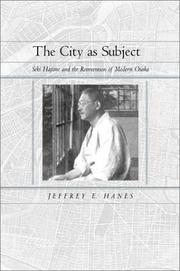| Listing 1 - 1 of 1 |
Sort by
|

ISBN: 0520926838 9786612356315 1282356313 1597345415 9780520926837 6612356316 9781597345415 0520228499 9780520228498 9781282356313 Year: 2002 Publisher: Berkeley University of California Press
Abstract | Keywords | Export | Availability | Bookmark
 Loading...
Loading...Choose an application
- Reference Manager
- EndNote
- RefWorks (Direct export to RefWorks)
In exploring the career of Seki Hajime (1873-1935), who served as mayor of Japan's second-largest city, Osaka, Jeffrey E. Hanes traces the roots of social progressivism in prewar Japan. Seki, trained as a political economist in the late 1890's, when Japan was focused single-mindedly on "increasing industrial production," distinguished himself early on as a people-centered, rather than a state-centered, national economist. After three years of advanced study in Europe at the turn of the century, during which he engaged Marxism and later steeped himself in the exciting new field of social economics, Seki was transformed into a progressive. The social reformism of Seki and others had its roots in a transnational fellowship of progressives who shared the belief that civilized nations should be able to forge a middle path between capitalism and socialism. Hanes's sweeping study permits us not only to weave social progressivism into the modern Japanese historical narrative but also to reconceive it as a truly transnational movement whose impact was felt across the Pacific as well as the Atlantic.
Economists --- Mayors --- Seki, Hajime, --- Osaka (Japan) --- Japan --- Economic conditions. --- Economic conditions --- capital. --- capitalism. --- city politics. --- class. --- east asia. --- factory production. --- history. --- industrial production. --- industrial revolution. --- japan. --- japanese history. --- japanese industry. --- marxism. --- mayor. --- meiji restoration. --- modern japan. --- nation. --- national economy. --- osaka. --- political economics. --- politician. --- politics. --- prewar japan. --- progressive politics. --- seki hajime. --- social change. --- social economics. --- social progressivism. --- social reform. --- socialism. --- textile industry. --- textile mills. --- transnational history. --- transnational movement. --- urbanism.
| Listing 1 - 1 of 1 |
Sort by
|

 Search
Search Feedback
Feedback About UniCat
About UniCat  Help
Help News
News